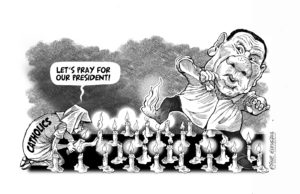
President Rodrigo Duterte’s attacks on the Catholic Church reached a new low when he accused Caloocan Bishop Pablo Virgilio David of stealing and insinuated that the prelate may be on drugs.
No less than professors of the national university, the University of the Philippines had in spite of its secularism noted that the President’s tirades against the Church are forms of hate speech.
We agree. For the tone of the President’s criticism of the Church has been lamentably far from civil or reasonable.
He has time and again insisted that he wants to be left alone to do his work, that his desire should be granted if the shepherds of the Church want to be left alone.
But it so happens that the Church, including personalities like Bishop David have been at the forefront of addressing the scourge of illegal drugs in ways diametrically opposed to Malacañang’s campaign to exterminate suppliers and the addicted.
Bishop David has been at the forefront of documenting the so-called war on drugs’ death toll that in his own diocese is among the nation’s highest. He has been shining the light on the involvement of policemen and their assets in the carnage.
His was the voice that prophesied against the perpetrators of the killing of teenager Kian de los Santos, who were recently convicted of murder.
The Catholic Bishops’ Conference of the Philippines, through its president, Davao Archbishop Romulo Valles has vouched for the character and integrity of Bishop David.
At a time when the social arms of the church are busy trying to educate citizens to vote with wisdom in elections to be held in May, demonizing the Church and its leaders looks like more of the tired, trite, futile attempts to silence a credible voice of dissent.
Whether any public official likes it or not, the discernment of the Church about public interest issues resonates with Catholics who take seriously their right to suffrage.
Whether a politico likes it or not, the Church’s voice resonates in reminding the electorate to shun evils like political dynasties, corruption, election cheating, fake news that cynics count as indispensable to political engagement.
The separation of the Church and State does not mean that either should work for the elimination of the other. As with science and religion, the government and the Church ought to purify each other.
Nowadays, almost as often as pastors deliver sermons, the President unfairly denounces the Church. He knows that even with the Church’s self-sabotaging wrinkles, he can never really quell its espousing of common good ideals or eclipse its most brilliant lights.